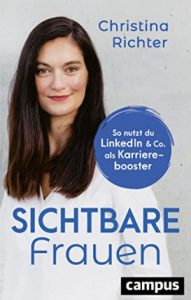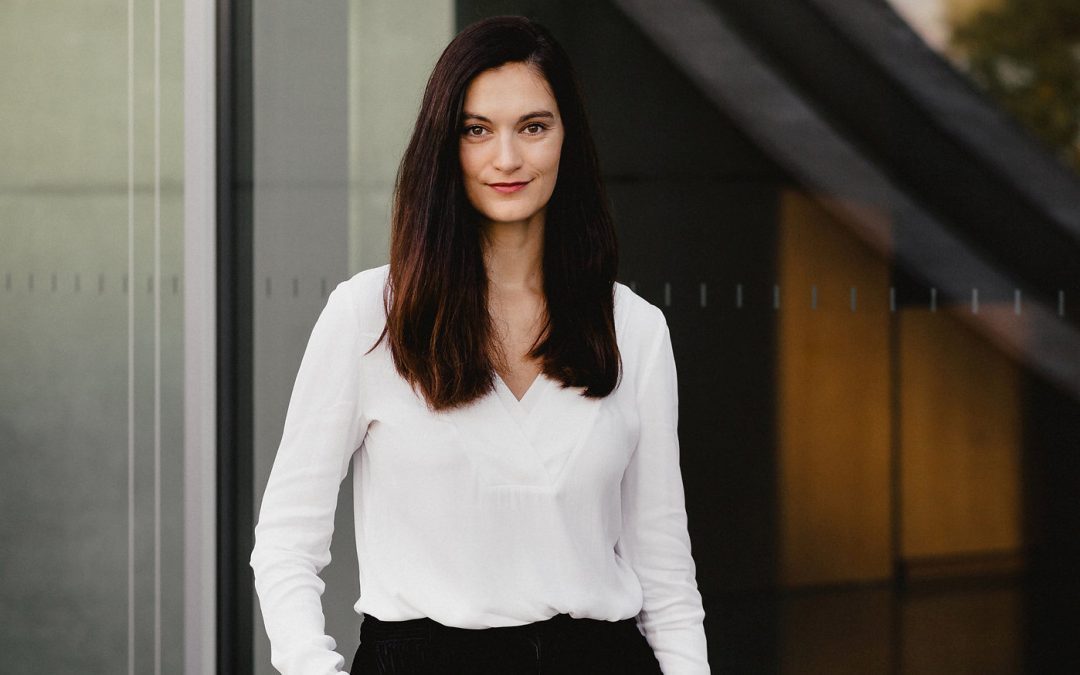Christina Richter is the founder and managing director of the Personal Branding Institute in Berlin. Her book "Visible women - how to use LinkedIn & Co. as a career booster" was recently published. Fund woman Anke Dembowski talks to her about how women can achieve more visibility, so that hopefully more women will soon be explaining the world to us.
Ms Richter, what grabbed you so much that you immediately wanted to write a book about visible women?
This was an article in Der Spiegel on the occasion of International Women's Day 2021. It was about an evaluation of how many women and men were mentioned by name over the last 12 months. Spiegel came up with a total of about 135,000 mentions by name, 28,000 by women and 107,000 by men. So I thought to myself: It can't be that there are so many fewer female experts than male experts on the most diverse topics covered in Spiegel!
 Why are women mentioned less in the media or quoted as experts?
Why are women mentioned less in the media or quoted as experts?
I think that although there are as many female experts as male experts on many topics, the female experts are often less visible. When you write an article or organise a panel, you might have to look a little harder for women, male interlocutors simply come to people's minds more readily.
Well, if it's faster with men...
That's exactly where I would like to see people not simply saying "unfortunately we haven't found a woman", but questioning the situation. The first four panellists are usually found quickly, but with the fifth one you can make an effort! But no, then it will be the fifth man on the panel! I realise that we all don't have time, but that's where the media professionals have to go the extra mile! I think it is also the media's responsibility to ensure a balanced ratio between women and men.
Where can the journalists and conference organisers look for suitable women?
I understand that it is often not so easy to find suitable experts. First, of course, you can look among your (social media) contacts. Then you can search further via Google or look at the relevant conference programmes. Or you can talk to your old contacts and ask them specifically for female interlocutors. Maybe you have to dig and search to find female experts from the second row. If it's always the same people speaking, it's very boring!
Just think of the reporting during the Corona pandemic: 78 % of the virologists consulted without a management function were male - with a management function it was even 95 %. That is quite a distorted picture when you consider that 47% of the medical staff in Germany are women. That is simply not the way to do it!
We often hear that women who are approached for a panel do not accept or refer to a (male) colleague.
Right, it's also up to us women ourselves. When a woman is asked to be on a panel or to provide quotes for a good publication, we should say yes! Often, however, women then wriggle out of it: "that's not 100% my area of expertise" or "I don't like life panels that much". My tip is: say yes, prepare well, and then go into the interview or panel with joy!
What are the advantages? What is the benefit of being more visible?
Look: LinkedIn is a strong focus, but anyone can post anything there. That's an advantage, but also a disadvantage. But if I speak on a professional panel or am quoted in a professional publication, then I first have to have convinced a journalist or journalists that I have something to say, that I am good. That is a kind of accolade. In my experience, the value of media coverage is much greater than a post on social media.
Don't women often think it's boastful to push themselves to the front?
Yes, often the issue of visibility has a negative touch with women. Women don't like to talk about their work and they don't like these Me, Myself and I shows. Many women say: "I want my work to speak for me", but that's nonsense! Your work alone cannot speak for you, you have to do it yourself! If you don't do it at all, it looks like you don't stand behind your work. Men just go out and tell what great things they have done. I encourage women to jump over their shadows and make themselves visible. We can go forward with our knowledge and expertise. And why shouldn't we talk about our work?
How is it with social media? It seems to me that women are quite active and well represented there.
Ja, langsam klickt es bei den Frauen, und viele sind auch auf den Social-Media-Kanälen aktiv. Trotzdem sind unter den Top-10 der erfolgreichsten LinkedIn-Profile only 2 women.
Why do more women than men think they have no say?
That probably goes back to our upbringing. Girls were always told to "stand in the corner and be quiet! Boys, on the other hand, are taught: "Go to the front! Be visible! Speak up!" Meanwhile, I do believe that younger people were brought up differently in this respect than older people. In the end, upbringing shapes immensely. In my trainings I see that women are much more critical of themselves than men. Some people ask me, "can I post this on LinkedIn?" Yes, of course you can! We have to try to change our mindset. That we understand: It's not bad to talk about my work or about me!
I am a journalist myself, and as such I often go through the press department of the respective company and ask for an expert on a certain topic. Most of the time, I then get a male interviewee suggested.
Yes, spokespersons at companies often come from the executive board, and there are more men there. There are 10 men among the top 10 DAX CEOs on LinkedIn. I think companies should also think about this: Who else do we have who can speak? Who is perhaps in the second management level and has expertise in this or that area? I don't understand why companies don't show their smart women much more.
Do you want to shout out something to us at the end, as a takeaway, so to speak?
Things have to change around the issue of women's visibility! Organisers, journalists, companies, but also the men and women in the companies themselves should make more of an effort to let women have their say. Women themselves should also dare to come forward more and not wait until they are discovered. And one more thing: If a woman already cancels an interview or a panel, it would actually be quite cool if she would then at least suggest another woman!
Vielen Dank für diesen Energie-Kick in Sachen Sichtbarkeit!
Fotografin: Farina Deutschmann



